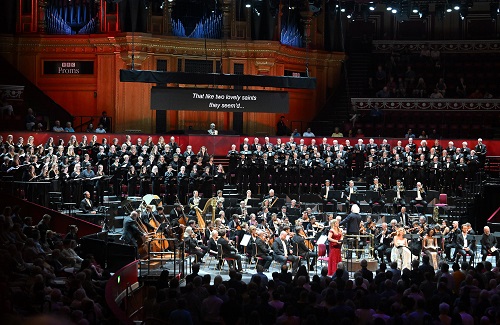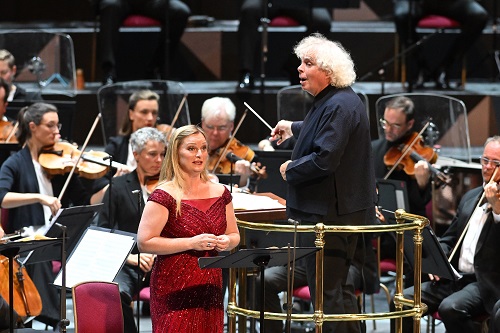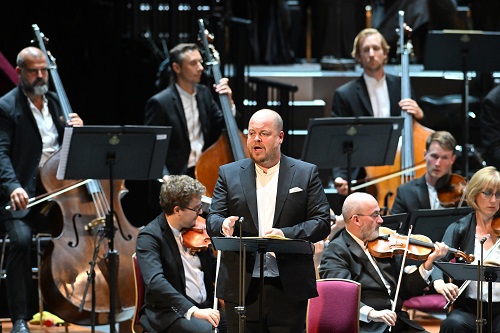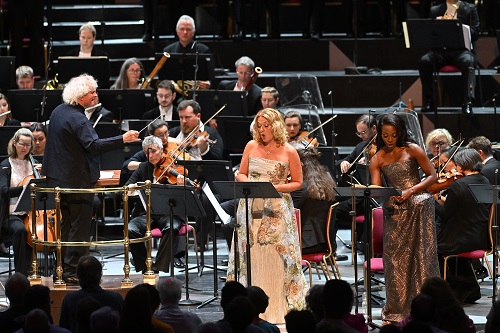“It’s the great masterpiece you’ve never heard.” So declared Sir Simon Rattle when he introduced Schumann’s Das Paradies und die Peri to the London Symphony Orchestra in 2015, in a performance at the Barbican, shortly before he took up his role as the orchestra’s Music Director. Their performance of the work was his first LSO Live recording, but Rattle had long been a champion of Schumann’s ‘secular oratorio’, having performed it in London with the Orchestra of the Age of Enlightenment in 2007, and with the Berlin Philharmonic.
His efforts to rehabilitate a work which, despite its initial success, disappeared from the repertoire in the twentieth century – perhaps after Goebbels found it, unfathomably, a useful propaganda tool for glorifying German war victims – have been matched by the eulogising of John Eliot Gardiner, Nikolaus Harnoncourt and others. Schumann himself wrote to the composer, conductor and music writer Karl Koßmaly, in May 1843: ‘at present I am engaged in a great work, the greatest that I have yet undertaken. It is no opera – I believe it is an entirely new genre for the concert hall.’ This was the Proms audience’s first chance to make their own judgement.

Das Paradies und die Peri is a Christian spin on a Persian myth. (Insert ‘sanctimonious’ before ‘Christian’, if you like.) Schumann’s text adapts – drawing on translations by J. L. Witthaus (1822) and Theodor Oelker (1839) – the second of the stories that form the Irish writer Thomas Moore’s extended poem, Lalla Rookh (1817). The composer and his friend Emil Flechsig constructed a libretto comprising three tableaux which chart a peri’s desperate attempts to find a portal to paradise – an Elysium from which she is excluded because she is the offspring of a fallen angel father and a mortal mother. She travels through India, North African and Arabia in search of the gift that will be most precious to her heavenly guardian and so secure her passage through the Eternal Gates. The blood of a young warrior killed by the tyrant Gazna is not up to scratch; the sighs of a maiden who dies in the arms of her plague-stricken beloved are similarly insufficient. But, the tears wept by a criminal who sees a young boy at prayer grant the peri (and the felon) redemption.
[It was a pity that, though there were surtitles, there was no synopsis or any indication of the sequence of the three parts of the work in the £6 programme.]
Schumann worked at speed, completing the three parts between February and May 1843, with the whole orchestrated by June. When the work was premiered at the Leipzig Gewandhaus on 4th December, with Schumann conducting, it was a huge success, and Das Paradies became Schumann’s best-known work during his lifetime, with performances throughout Germany, Europe, and even in the US. It even, mimicking the peri’s progress, enabled him to finally win the belated approval of his father-in-law, Friedrich Wieck.
Today, we might be less enamoured of Moore’s or Das Paradies’ exotic noble savagery or saccharine sentimentality, but these are presumably the qualities that attracted Schumann. It’s not just the text but also the music that, to me, feels very ‘Victorian’. Despite the flashes of the ‘orchestral orient’ that Schumann conjures, it all feels rather smug: as one as my friends, who’d been listening to the Radio 3 broadcast, put it, ‘rustic-German-Victorian – with lederhosen rather than frock coats’. Despite the secular text, during this Prom Lutherian four-squareness often came to mind in those grand choruses which strive for Mendelssohnian brio but too often don’t quite find it. And, Bach makes his presence felt, too: although there’s only one real recitative, for the narrator near the start, those obligatory fugues rear their head.

Interestingly, the director Peter Sellars tried to drag Das Paradies into the twenty-first century, in a 2018 staging of the work, with the Los Angeles Philharmonic conducted by Gustavo Dudamel which related the peri’s crisis to modern-day conflicts in Kashmir, Egypt and Syria (with a sprinkling of AI ‘magic’, too). Lucy Crowe sang the role of the Peri in that production.
I’m not sure that this work really bears such ‘re-location’ or ‘dramatisation’. For, opera it is not, though Schumann’s initial ideas were leaning in that direction. Presumably he realised that it would be rather too much trouble to re-work Moore’s lyric text into dramatic dialogue, and that drops of blood, a sigh and a single tear might make less impact in the theatre than they do on the page. The work’s form and style are interesting, though. Schumann seems to have been influenced by another ‘exotic’ cantata, Heinrich Marschner’s Klänge aus dem Osten (1842), in adopting a through-composed form whereby the various arias and chorus run on with only the occasional pause, thereby maintaining dramatic momentum. And, the use of a quartet of soloists who comment on the action is innovative too.
Moreover, one has to allow that Schumann does achieve astonishing shifts from a sort of chamber-like intimacy – the LSO was pared down to Classical size, and the brass were appropriately diplomatic – to grander orchestral and choral landscapes, and back again. He also relishes the opportunities for the exotic pictorialism that the choruses of Nile genies, Syrian houris and peris in perdition provide.

Rattle’s affection for this music was never in doubt. This was a refined and lyrical performance, often surprisingly restrained, as he let the light, graceful lines run their sweet course. The music for the Nile genies was accompanied by a delicate interweaving of the strings and upper woodwind; ‘Schlaf’ nun und ruhe’ at the close of Part 2 was a wonderfully tender lullaby – a poignant moment of peace which would be ruptured by the denial of the fated lovers’ sighs at the start of Part 3. There was strength when it was required, though, as in the Chorus of Conquerors in Part 1 after the tyrant Gazna’s victory, though I didn’t feel real ‘terror’ running through their celebrations, such as the dark colour of the ophicleide and the clash of cymbals, screech of piccolos and slam of drums might be imagined to conjure.
That said, Rattle did encourage characterful playing, particularly from the woodwind, and it often felt to me that the orchestral writing – paradoxically, perhaps, given that this is one aspect of Schumann’s writing that has often come in for a critical slating – was where the true interest of the work lies. The vocal lines – both solo and choral – are melodious, but it is in the orchestra that we seem to gain access to the peri’s consciousness. Rather as, in the lieder, it is often in the piano writing that the most profound ‘meaning’ seems to lie.
There was some very fine singing here though. Lucy Crowe was a radiant Peri, her light lyric soprano eminently suitable to the ‘innocence’ of the role. She convincingly conveyed both the more folk-like and operatic qualities of the vocal writing and her transformation from despair to triumph and transfiguration at the close – a wonderfully glowing high C – was brilliantly delivered. Just occasionally I felt, as I have in the past, that for all the beauty of Crowe’s soprano, it is a little ‘empty’: she soars and glows effortless, but could there have been a bit more variety of colour, a bit more depth to the delicious brightness?

Such depth, a paradoxical earthiness even, was offered by Magdalena Kožená as the Angel. It’s not a big role, but the warmth and vitality of Kožená’s mezzo conveyed a beguiling sympathy. In that 2015 LSO performance, Andrew Staples sang the part of the Young Man, with Mark Padmore taking the narrator’s role. Staples has now moved into the driving seat, so to speak, and he was an engaging guide, attentive to the text but not overly ‘dramatic’. If Florian Boesch was a little dry and insufficiently menacing as the cruel Gazna, then his later aria, ‘Jetzt sank des Abends goldner Schein’ was appropriately gilded of tone. As the plague-stricken lovers, Jeanine De Bique and Linard Vrielink made strong contributions, their voices glimmering movingly, if not always projecting strongly.
In 1842, Schumann wrote to Koßmaly declaring his ‘morning and evening artist’s prayer’ to be for ‘German opera. That’s where a contribution can be made!’, and shortly after completing Das Paradies, he wrote in the Tagebuch that ‘the next thing shall be an opera, and I’m fired up about it’. Surely this ‘secular oratorio’ should be seen a step along that road, one which led to the ill-fated Genoveva in 1850?
That said, one can understand Rattle’s affection and admiration for Das Paradies. A reviewer of a performance in London, in 1856, described it as ‘a work of great genius and power’ and even though his praise was qualified – the elaborateness and intricacy of the score created ‘such a profusion of minute and complicated details that the ear is perplexed, and finds it difficult to trace the simple form through the multitude of orchestral combinations and ornaments in which it is enveloped’ – he found comparison with ‘those pre-Raphaelite pictures in which every object is delineated with the laborious distinctness of miniature painting, or of the nice tracery and carved work of a florid Gothic edifice … When the ear is once accustomed to it, it may be found that it is no longer perplexing, but only heightens the richness of the colouring without obscuring the form.’
Despite my own doubts about the ‘genius’ of Das Paradies und die Peri, Rattle and his musicians and singers made a good pitch at this Prom.
Claire Seymour
Prom 49: Schumann: Das Paradies und die Peri
Lucy Crowe (soprano), Jeanine De Bique (soprano), Magdalena Kožená (mezzo-soprano), Andrew Staples (tenor), Linard Vrielink (tenor), Florian Boesch (baritone), London Symphony Chorus, London Symphony Orchestra, Sir Simon Rattle (conductor)
Royal Albert Hall, South Kensington, London; Tuesday 22nd August 2023.
ABOVE: Lucy Crowe, Sir Simon Rattle and the London Symphony Orchestra (c) BBC / Mark Allan